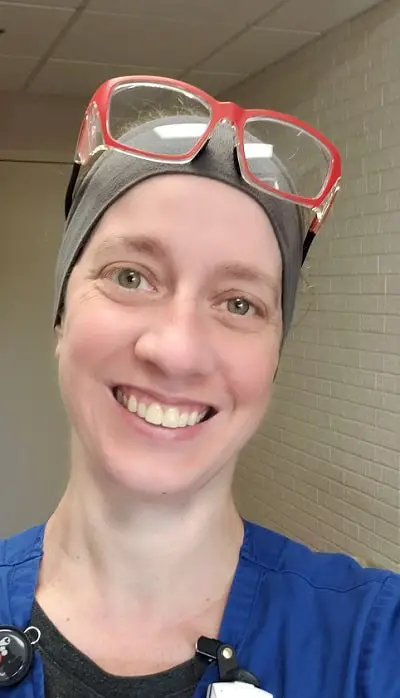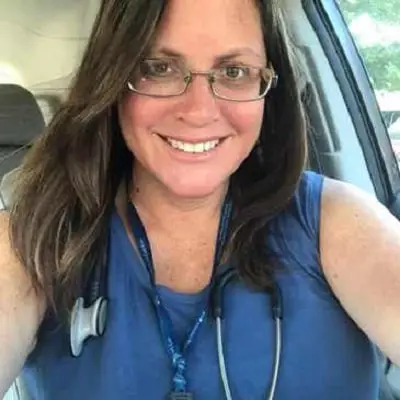Salary, Job Description, How To Become One, and Quiz
.jpg)
Registered Nurses
Registered Nurses assess patient health problems and needs, develop and implement nursing care plans, and maintain medical records. Administer nursing care to ill, injured, convalescent, or disabled patients. May advise patients on health maintenance and disease prevention or provide case management. Licensing or registration required.
Table of contents
What they do
Registered Nurses assess patient health problems and needs, develop and implement nursing care plans, and maintain medical records. Administer nursing care to ill, injured, convalescent, or disabled patients. May advise patients on health maintenance and disease prevention or provide case management. Licensing or registration required.
- Maintain accurate, detailed reports and records.
- Administer medications to patients and monitor patients for reactions or side effects.
- Record patients’ medical information and vital signs.
- Monitor, record, and report symptoms or changes in patients’ conditions.
Typical day
On a daily basis, Registered Nurses perform administrative or managerial functions, such as taking responsibility for a unit’s staff, budget, planning, or long-range goals. They maintain accurate, detailed reports and records.
A typical day for a Registered Nurse will also include:
- Record patients’ medical information and vital signs.
- Observe nurses and visit patients to ensure proper nursing care.
- Prepare rooms, sterile instruments, equipment, or supplies and ensure that stock of supplies is maintained.
- Work with individuals, groups, or families to plan or implement programs designed to improve the overall health of communities.
- Consult and coordinate with healthcare team members to assess, plan, implement, or evaluate patient care plans.
Other responsibilities
Besides their typical day, Registered Nurses also refer students or patients to specialized health resources or community agencies furnishing assistance. They may also prescribe or recommend drugs, medical devices, or other forms of treatment, such as physical therapy, inhalation therapy, or related therapeutic procedures.
On a weekly to monthly basis, Registered Nurses provide or arrange for training or instruction of auxiliary personnel or students. They might also assess the needs of individuals, families, or communities, including assessment of individuals’ home or work environments, to identify potential health or safety problems.
In addition, they consult with institutions or associations regarding issues or concerns relevant to the practice and profession of nursing.
Although specific duties may vary, many of them hand items to surgeons during operations.
To some Registered Nurses, it is also their responsibility to perform physical examinations, make tentative diagnoses, and treat patients en route to hospitals or at disaster site triage centers.
What is the job like
Job satisfaction
Is this job meaningful
71% said they were satisfied with their job and 80% said they found their job meaningful.
I’m a high risk antepartum/labor and delivery nurse with a IV home care aspect to it. I have been an RN in the field for the past 20 years. My Typical Day The shift is a 12-hour shift and you are responsible for laboring patients, assisting the high-risk pregnant patients. For each patient that is … Read More
I am a registered nurse currently working part time in Emergency dept but have also specialized in acute surgery for 25 years prior to changing specialties. I also own a Cosmedical clinic. There is no such thing as a typical day in nursing. While we attempt to have a sort of routine on the wards … Read More
My name is Molly Foss and I’m a Registered Nurse. I’ve been a nurse for 11 years. I have my 2 year ADN degree, my 4 year BSN degree, and I’m certified in ACLS (Advanced Cardiac Life Support). I am also a Charge Nurse and a Preceptor on my floor and I’m our representative at … Read More
I am a Registered Nurse in a level 1 trauma emergency room in Detroit, MI. My day begins at 7 am taking over the night shift caring for any patients we may be holding in the department awaiting a bed assignment on the inpatient side. There is also a constant influx of urgent patients that … Read More
My name is Ioannes. I am a 28 years old state certified geriatric nurse from Germany and I worked for Caritas Frankfurt in a home for the elderly. My Typical Day My typical workday on the early shift looks like this: First of all, team meeting early in the morning at 6 a.m. and find … Read More
I work at a surgery centre and rotate between the Pre Op area and PACU (recovery). I also work with children. A typical day depends on the area I’m working in. But if is preop I arrive by 630 and begin to get everything ready for the day. I check crash carts, turn on oxygen, … Read More
Currently, I am a Primary Charge Nurse on a Family Birthing unit in a level II hospital. We are a smaller hospital (total of 97 patient beds), so our birthing unit actually encompasses seven units into one. We cover any woman who is pregnant, from triaging, long-term stays, labor/delivery, OR and recovery, postpartum, and nursery. … Read More
I have worked as a nurse at the bedside before in the adult ICU, interventional radiology, and in out-patient pediatric sedation. What is your work life like? Arrive at the unit between 7-9 am (depending on when my shift that day started) and receive a report from the nurse who was “in charge” that day. … Read More
I am a Registered Nurse and I work at the Visiting Nurses Association of Cape Cod. My Typical Day My typical day consists of visiting patients in their homes. My patients’ diagnoses range from coming home from surgery to needing wound care or intravenous therapy. I perform complete physical assessments of each patient, which includes … Read More
Pros
Suitable for people who like to help and teach others.
Suitable for people who value relationships between co-workers and customers and want to work in a friendly non-competitive environment.
This career is perfect for people who love to work indoors.
It is not too difficult to get into this career. Previous work-related skill, knowledge, or experience is required for this career.
Normal working hours (40 hours per week).
Cons
Not suitable for people who like to work with designs.
How much do they make
Average salary
Average hourly wage
Entry-level Registered Nurses with little to no experience can expect to make anywhere between $53,410 to $61,630 per year or $26 to $30 per hour.
| Salary by experience | Annual | Hourly |
|---|---|---|
| Highest (Top 10%) | $116,230 | $56 |
| Senior (Top 25%) | $93,590 | $45 |
| Median | $75,330 | $36 |
| Junior (Bottom 25%) | $61,630 | $30 |
| No experience (Bottom 10%) | $53,410 | $26 |
This table shows the top 10 highest paying industries for Registered Nurses based on their average annual salary.
| Salary by industry | Annual | Hourly |
|---|---|---|
| Business Support Services | $106670 | $51.28 |
| Federal Executive Branch | $96230 | $46.26 |
| Pharmaceutical and Medicine Manufacturing | $92110 | $44.29 |
| Other Investment Pools and Funds | $91990 | $44.23 |
| Office Administrative Services | $89490 | $43.02 |
| Outpatient Care Centers | $89300 | $42.93 |
| Aerospace Product and Parts Manufacturing | $89040 | $42.81 |
| Petroleum and Coal Products Manufacturing | $88660 | $42.63 |
| Other Amusement and Recreation Industries | $84800 | $40.77 |
| Wholesale Electronic Markets and Agents and Brokers | $84450 | $40.60 |
View more salary by industries here.
Where can they work
Where can Registered Nurses work? Here is a table showing the top 10 largest employers of Registered Nurses including the average salary in that industry.
| Employers | Total Employed | Annual Salary | Hourly Wages |
|---|---|---|---|
| General Medical and Surgical Hospitals | 1729200 | $81680 | $39.27 |
| Offices of Physicians | 192300 | $71660 | $34.45 |
| Home Health Care Services | 169630 | $75870 | $36.48 |
| Outpatient Care Centers | 150380 | $89300 | $42.93 |
| Nursing Care Facilities (Skilled Nursing Facilities) | 143250 | $72090 | $34.66 |
| Federal Executive Branch | 86860 | $96230 | $46.26 |
| Specialty Hospitals | 63910 | $82910 | $39.86 |
| Elementary and Secondary Schools | 54500 | $62170 | $29.89 |
| Employment Services | 51860 | $75300 | $36.20 |
| Psychiatric and Substance Abuse Hospitals | 39840 | $77250 | $37.14 |
What is the work day like
Working hours
Working schedule
How often do you use email in this job?
Telephone
How often do you have telephone conversations in this job?
Group discussions
How often do you have group discussions in this job?
Public speaking
How often does this job require you to do public speaking?
Level of competition
How much competitive pressure is in this job?
What is the work environment like
Office-style environment
Indoors in an environmentally controlled condition
Warehouse-style environment
Indoors in a non-controlled environmental condition such as a warehouse
Outdoors
Outdoors exposed to all weather conditions
Outdoors – Under Cover
Outdoors but under cover (e.g. structure with roof but no walls)
How to become one
Difficulty to become one
Required level of education
What level of education do you need to perform the job?
Relevant majors
Clinical Nurse Leader
Nursing Practice
Emergency Room/Trauma Nursing
Occupational and Environmental Health Nursing
Critical Care Nursing
Clinical Nurse Specialist
Perioperative/Operating Room and Surgical Nurse/Nursing
Public Health/Community Nurse/Nursing
Psychiatric/Mental Health Nurse/Nursing
Pediatric Nurse/Nursing
Forensic Nursing
Women’s Health Nurse/Nursing
Geriatric Nurse/Nursing
Palliative Care Nursing
Relevant work experience
How much related work experience do you need to get hired for the job?
On The Job Training
How much on the job training do you need to perform the job?
Should you become one
Best personality type for this career
People with this personality type likes to work with people and in teams. They prefer work that allows them to build relationships with others.
People with The Builder personality type likes practical and hands-on work. They prefer working with plants, animals, and real-world materials like wood, tools, and machinery.
People with The Thinker personality likes to work with ideas that require an extensive amount of thinking. They prefer work that requires them to solve problems mentally.
People with The Artist personality likes to work with designs and patterns. They prefer activities that require self-expression and prefer work that can be done without following a clear set of rules.
People with The Helper personality type likes to work with people and in teams. They prefer work that allows them to build relationships with others.
People with The Leader personality likes to start and work on projects. They also like leading people and making many decisions.
People with The Organizer personality type likes to follow set procedures and routines. They prefer working with data and details more than with ideas.
You can read more about these career personality types here.
People who are suitable for this job tend to like working with, communicating with, and teaching people. They like helping or providing service to others.
They also like working with ideas and require an extensive amount of thinking. They like searching for facts and figuring out problems mentally.
Take this quiz to see if this is the right career for you.
Work Values
Which values are the most important to a person’s satisfaction for this job?
You are someone who is results oriented. You prefer work that allows you to utilize your skills and abilities while at the same time giving you a sense of accomplishment.
You are someone who values job security, steady employment, and good working conditions. You also prefer work that keeps you busy all the time with something different to do every day.
You are someone who values job advancement and leadership roles. You prefer work that receives recognition for the work you do and jobs that are looked up to by others in the company and your community.
You are someone who likes to provide a service to others. You prefer a work environment where you can work with your co-workers in a friendly non-competitive environment.
You are someone who values a company that stands behind their employees. You prefer a work environment where everyone is treated fairly and is being supported by the company.
You are someone who likes to work on your own and make your own decisions. You prefer work that requires little supervision and are allowed to try out your own ideas.
Don’t know which career to pursue?
Take the career quiz to find careers that match your personality type.
Take The Career Quiz







.jpg)




.jpg)
.jpg)
.jpg)
.jpg)
.jpg)
.jpg)
.jpg)
.jpg)
